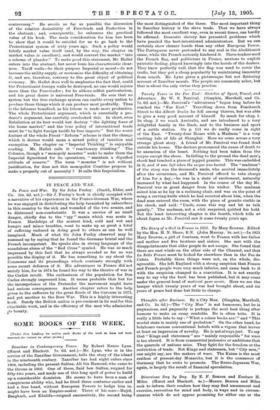[Under this heading we notice such Books of the week
as hays no been reserved for review in other forms.]
Zanzibar in Contemporary Times. By Robert Nunez Lyne. (Hurst and Blackett. 7s. 6d. net.)—Mr. Lyne, who is in the service of the Zanzibar Government, tells the story of the island in the nineteenth century. Zanzibar has had eight rulers since 1804, including the present Sultan, Ali bin Hamoud, who came to the throne in 1902. One of these, Said ben Sultan, reigned for fifty-two years, and made use of this long spell of power to build up a considerable dominion. He seems to have been a man of conspicuous ability who, had he lived three centuries earlier and had a free hand, without -European Powers to hedge him in, miiFht have been an Empire-maker. Three of his sons—Majid, Barghash, And Khalifa—reigned successively, the second being the most distinguished of the three. The most important thing- in Zanzibar history is the slave trade. That we have always followed the most excellent way, even in recent times, can hardly. be affirmed. Domestic slavery has presented problems which have puzzled the best-intentioned administrators. But we can certainly show cleaner hands than any other European Power. The Portuguese never pretended to any zeal in the Abolitionist cause, while the French seriously hindered it. Slave-traders used the French flag, and politicians in France, anxious to exploit patriotic feeling, played knowingly into the hands of the dealers. They knew perfectly well that the flag was used to cover the traffic, but they got a cheap popularity by maintaining immunity from search. Mr. Lyne gives a picturesque but not flattering account of Zanzibar morals. The people are commonly sober, but that is about the only virtue they practise.






































 Previous page
Previous page